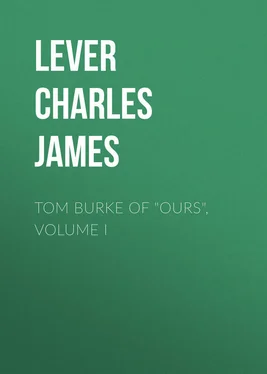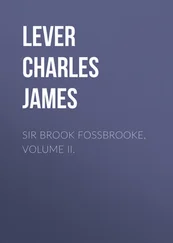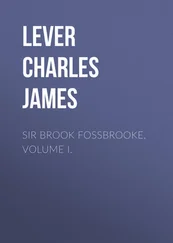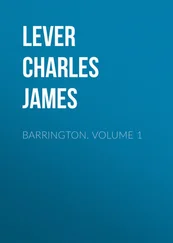Charles Lever - Tom Burke Of Ours, Volume I
Здесь есть возможность читать онлайн «Charles Lever - Tom Burke Of Ours, Volume I» — ознакомительный отрывок электронной книги совершенно бесплатно, а после прочтения отрывка купить полную версию. В некоторых случаях можно слушать аудио, скачать через торрент в формате fb2 и присутствует краткое содержание. Жанр: literature_19, foreign_antique, foreign_prose, на английском языке. Описание произведения, (предисловие) а так же отзывы посетителей доступны на портале библиотеки ЛибКат.
- Название:Tom Burke Of Ours, Volume I
- Автор:
- Жанр:
- Год:неизвестен
- ISBN:нет данных
- Рейтинг книги:3 / 5. Голосов: 1
-
Избранное:Добавить в избранное
- Отзывы:
-
Ваша оценка:
- 60
- 1
- 2
- 3
- 4
- 5
Tom Burke Of Ours, Volume I: краткое содержание, описание и аннотация
Предлагаем к чтению аннотацию, описание, краткое содержание или предисловие (зависит от того, что написал сам автор книги «Tom Burke Of Ours, Volume I»). Если вы не нашли необходимую информацию о книге — напишите в комментариях, мы постараемся отыскать её.
Tom Burke Of Ours, Volume I — читать онлайн ознакомительный отрывок
Ниже представлен текст книги, разбитый по страницам. Система сохранения места последней прочитанной страницы, позволяет с удобством читать онлайн бесплатно книгу «Tom Burke Of Ours, Volume I», без необходимости каждый раз заново искать на чём Вы остановились. Поставьте закладку, и сможете в любой момент перейти на страницу, на которой закончили чтение.
Интервал:
Закладка:
CHAPTER VI. MY EDUCATION
As I thought over the various incidents the last few days of my life had presented, I began to wonder with myself whether the world always went on thus, and if the same scenes of misery and woe I had witnessed were in the ordinary course of nature. The work of years seemed to me to have been accomplished in a few brief hours. Here, where I stood but yesterday, a happy family were met together; and now, death and misfortune had laid waste the spot, and save the cold walls, nothing marked it as a human habitation. What had become of them? where had they gone to? Had they fled from the blood-stained hands of the cruel soldiery, or were they led away to prison? These were the questions constantly recurring to my mind. And the French officer, too, – what of him? I felt the deepest interest in his fate. Poor fellow! he looked so pale and sickly; and yet there was something both bold and manly in his flashing eye and compressed lip. He was doubtless one of those Darby alluded to. What a lot was his! and how little did my own sorrows seem, as I compared them with his houseless, friendless condition!
As my thoughts thus wandered on, a dark shadow fell across the gleam of moonlight that lit up the ruined cabin. I turned suddenly, and saw the figure of a man leaning against the doorpost. For a second or two fear was uppermost in my mind, but rallying soon, I called out, “Who ‘s there?”
“‘T is me. Darby M’Keown!” said a well-known voice, but in a tone of deepest sorrow. “I came over to have a look at the ould walls once more.”
“You heard it all, then. Darby?”
“Yes; they wor bringing the prisoners into Athlone as I left the town, and I thought to myself you ‘d maybe be hiding somewhere hereabouts. Is the captain away? Is he safe?”
“The French officer? Yes, he escaped early in the business. I know he must be far off by this time; Heaven knows which way, though.”
“Maybe I could guess,” said Darby, quietly. “Well, well! it ‘s hard to know what ‘s best. Sometimes it would seem the will of God that we are n’t to succeed; and if we hadn’t right on our side, it would not be easy to bear up against such misfortunes as these.”
There was a silence on both sides after these words, during which I pandered them well in my mind.
“Come, Mister Tom!” said Darby, suddenly; “‘tis time we were moving. You ‘re not safe here no more nor others. Basset is looking for you everywhere, and you ‘ll have to leave the neighborhood, for a while at least. Your friend, the captain, too, is gone; his regiment marched yesterday. So now make up your mind what to do.”
“That’s easily done, Darby,” said I, attempting to seem at ease. “Whichever is your road shall be mine, if you let me.”
“Let you? Yes, with a hearty welcome, too, my darling! But the first thing is to get you some clothes that won’t discover on you. Here ‘s a hat I squeezed into my own that ‘ll just fit you; and I ‘ve a coat here that ‘s about your size. That’s enough for the present; and as we go along, I ‘ll teach you your part, how you are to behave, and he ‘ll be no fool that ‘ll find you out after ten days or a fortnight.”
My change of costume was soon effected, and my wound, which turned out to be a trifling one, looked after. I took a farewell look at the old walls, and stepped after my companion down the boreen.
“If we make haste,” said Darby, “we’ll be beyond Shannon Harbor before day; and then, when we ‘re on the canal, we ‘ll easy get a lift in some of the boats going to Dublin.”
“And are you for Dublin?” inquired I, eagerly.
“Yes. I’m to be there on the twenty-fourth of this month, please God. There ‘s a meeting of the friends of Ireland to be then, and some resolutions will be taken about what ‘s to be done. There ‘s bad work going on in the Parliament.”
“Indeed, Darby! What is it?”
“Oh! you couldn’t understand it well. But it’s just as if we war n’t to have anything to say to governing ourselves; only to be made slaves of, and sent abroad to fight for the English, that always hate us and abuse us.”
“And are we going to bear with this?” cried I, passionately.
“No,” said Darby, laying his hand on my shoulder, – “no; not at least if we had twenty thousand like you, my brave boy. But you’ll hear everything yourself soon. And now, let me attend to your education a bit, for we’re not out of the enemy’s country.”
Darby now commenced his code of instruction to me, by which I learned that I was to perform a species of second to him in all minstrelsy; not exactly on the truest principles of harmony, but merely alternating with him in the verses of his songs. These, which were entirely of his own composition, were all to be learned, – and orally, too, for Mister M’Keown was too jealous of his copyright ever to commit them to writing, and especially charged me never to repeat any lyric in the same neighborhood.
“It’s not only the robbery I care for,” quoth Darby, “but the varmints desthroys my poethry completely; some’ times changing the words, injuring the sentiments, and even altering the tune. Now, it’s only last Tuesday I heerd ‘Behave politely,’ to the tune of ‘Look how he sarved me!’”
Besides the musical portion of my education, there was another scarcely less difficult to be attended to: this was, the skilful adaptation of our melodies, not only to the prevailing tastes of the company, but to their political and party bearings; Darby supplying me with various hints how I was to discover at a moment the peculiar bias of any stranger’s politics.
“The boys,” said Darby, thereby meaning his own party, “does be always sly and careful, and begin by asking, maybe, for ‘Do you incline?’ or ‘Crows in the barley,’ or the like. Then they ‘ll say, ‘Have you anything new, Mister M’Keown, from up the country?’ ‘Something sweet, is it?’ says I. ‘Ay, or sour, av ye have it,’ they ‘ll ‘say. ‘Maybe ye’d like “Vinegar-hill,” then,’ says I. Arrah, you’d see their faces redden up with delight; and how they ‘ll beat time to every stroke of the tune, it ‘s a pleasure to play for them. But the yeos (meaning the yeomen) will call out mightily, – ‘Piper! halloo there! piper, I say, rise The Boyne water, or Croppies lie down.’”
“And of course you refuse, Darby?”
“Refuse! Refuse, is it? and get a bayonet in me? Devil a bit, my dear. I ‘ll play it up with all the spirit I can; and nod my head to the tune, and beat the time with my heel and toe; and maybe, if I see need of it, I fasten this to the end of the chanter, and that does the business entirely.”
Here Darby took from the lining of his hat a bunch of orange ribbon, whose faded glories showed it had done long and active service in the cause of loyalty.
I confess Darby’s influence over me did not gain any accession of power by this honest avowal of his political expediency; and the bold assertion of a nation’s wrongs, by which at first he won over my enthusiasm, seemed sadly at variance with this truckling policy. He was quicksighted enough to perceive what was passing in my mind, and at once remarked, —
“‘Tis a hard part we’re obliged to play, Master Tom; but one comfort we have, – it ‘s only a short time we ‘ll need it. You know the song? “Here he broke into the popular tune of the day: —
“‘And the French will come again,
Says the Shan van vaugh;
And they ‘ll bring ten thousand men.
Says the Shan van vaugh;
And with powder and with ball,
For our rights we ‘ll loudly call:
Don’t you think they ‘ll hear us then!
Says the Shan van vaugh.’
Ye must larn that air, Master Tom. And see, now, the yeos is as fond of it as the boys; only remember to put their own words to it, – and devil a harm in that same when one ‘s not in earnest. See, now, I believe it ‘s a natural pleasure for an Irishman to be humbugging somebody; and faix, when there ‘s nobody by he ‘d rather be taking a rise out of himself than doing nothing. It ‘s the way that ‘s in us, God help us! Sure it ‘s that same makes us sich favorites with the ladies, and gives us a kind of native janius for coortin’:
Читать дальшеИнтервал:
Закладка:
Похожие книги на «Tom Burke Of Ours, Volume I»
Представляем Вашему вниманию похожие книги на «Tom Burke Of Ours, Volume I» списком для выбора. Мы отобрали схожую по названию и смыслу литературу в надежде предоставить читателям больше вариантов отыскать новые, интересные, ещё непрочитанные произведения.
Обсуждение, отзывы о книге «Tom Burke Of Ours, Volume I» и просто собственные мнения читателей. Оставьте ваши комментарии, напишите, что Вы думаете о произведении, его смысле или главных героях. Укажите что конкретно понравилось, а что нет, и почему Вы так считаете.












